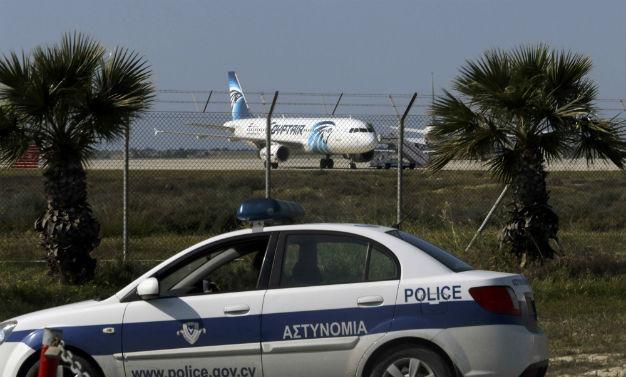Hijacker of EgyptAir flight arrested as Greek Cyprus airport drama ends
LARNACA - Agence France-Presse

Police stand guard at Larnaca Airport near a hijacked Egyptair Airbus A320 , March 29, 2016. REUTERS photo
Authorities arrested the hijacker of an Egyptian airliner that was diverted to Greek Cyprus on March 29, after the plane's passengers and crew were able to escape unharmed.
The hijacker, who officials said was motivated by personal reasons and who had reportedly claimed to be wearing an explosives belt, was detained after several tense hours at Larnaca airport where the plane had landed.
"The hijacker has just been arrested," Greek Cypriot government spokesman Nicos Christodoulides said on Twitter. No further details were immediately available.
An AFP correspondent saw a man emerging from the aircraft, walking across the tarmac and then raising his hands to two awaiting counter-terrorism officers. They laid him on the ground and searched him for around two minutes before taking him away.
Passengers and crew had earlier been seen leaving the aircraft, including one who climbed out of the cockpit window.
"The passengers are safe and the crew is safe," Egypt's civil aviation minister Sherif Fathy said on state television minutes after Greek Cyprus said the hijacker had been taken into custody.
Egypt's Prime Minister Sharif Ismail said in televised remarks that the alleged hijacker was an Egyptian and had demanded to speak to a European Union representative.
Officials earlier said there was no link to "terrorism" in the incident and that the hijacker had demanded to see a Greek Cypriot woman who was his estranged lover, with whom he had children.
"This is not about terrorism. This is about the individual action of a person who is psychologically unstable," said the Greek Cypriot foreign ministry's permanent secretary, Alexandros Zenon.
The EgyptAir plane landed at the airport in the southern coastal city of Larnaca at 8:50 am (0550 GMT), after the hijacker had contacted the control tower 20 minutes earlier to demand the diversion.
Egyptian civil aviation said he had threatened to detonate an explosives belt on the Airbus A-320, which had been headed from the Mediterranean coastal city of Alexandria to Cairo.
Most of the passengers were allowed to disembark after the plane landed, but a handful of crew and passengers had remained on board until shortly before the hijacker's arrest.
Fathy had told a press conference that the captain, a co-pilot, an air hostess and a security guard, along with three passengers, had remained on board after other passengers and crew were released.
Fathy said there had been 55 passengers on board the plane and that the hijacker had demanded it land in either Turkey or Greek Cyprus.
The plane had been carrying 21 foreigners including eight Americans, four Dutch citizens, four Britons and a French citizen, an Egyptian civil aviation ministry statement said.
Greek Cyprus President Nicos Anastasiades had earlier told reporters the incident appeared to be motivated by personal reasons.
"The hijacking is not terrorism-related," he told a joint news conference with the visiting president of the European Parliament, Martin Schultz.
Asked about reports that the hijacker had demanded to see a Greek Cypriot woman, Anastasiades laughed and said: "Always there is a woman."
The plane had been parked on the tarmac away from the new terminal building but just 200 metres (yards) from a beach where dozens of foreign tourists were out.
The airport, the main entry point for tourists to the resort island, was closed and incoming flights diverted to Paphos on the country's western edge.
Concerns were raised about security at Egyptian airports after a Russian airliner was downed on October 31 over Egypt's Sinai Peninsula, killing all 224 people on board. The Islamic State of Iraq and the Levant (ISIL) group claimed to have smuggled a bomb on board the plane.
Larnaca is no stranger to hostage crises. Several hijacked planes were diverted to the airport in the last few decades.
In August 1996, a Sudan Airways Airbus A-310 was hijacked by seven Iraqis between Khartoum and Amman with 199 people on board. After a stopover in Larnaca it flew on to London's Stansted airport, where the hijackers gave themselves up.
In 1988, a Kuwait Airways flight hijacked en route from Bangkok to Kuwait was diverted to Iran's second city Mashhad and later to Larnaca, where hijackers killed two Kuwaiti passengers and dumped their bodies on the tarmac.
In February 1978, an Egyptian commando unit stormed a hijacked Cyprus Airways DC-8 at Larnaca airport, where 15 passengers were being held hostage. Some 15 Egyptian soldiers were killed and 15 wounded in a firefight with Greek Cypriot forces. All the hostages were freed and the hijackers arrested.
